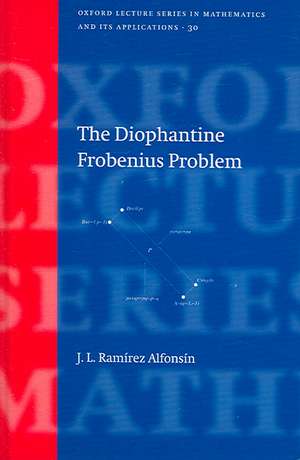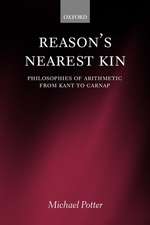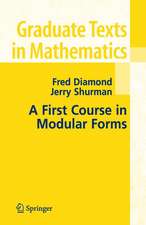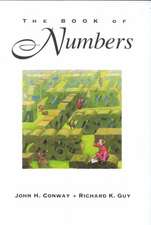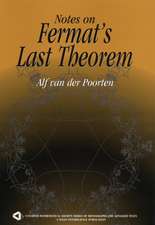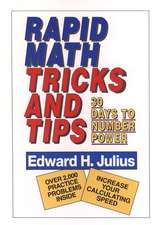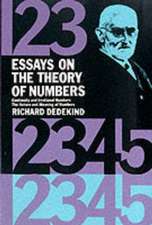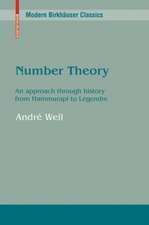The Diophantine Frobenius Problem: Oxford Lecture Series in Mathematics and Its Applications
Autor Jorge L. Ramírez Alfonsínen Limba Engleză Hardback – dec 2005
Din seria Oxford Lecture Series in Mathematics and Its Applications
- 24%
 Preț: 535.96 lei
Preț: 535.96 lei - 30%
 Preț: 570.43 lei
Preț: 570.43 lei - 19%
 Preț: 435.37 lei
Preț: 435.37 lei - 30%
 Preț: 785.22 lei
Preț: 785.22 lei - 34%
 Preț: 795.04 lei
Preț: 795.04 lei - 34%
 Preț: 685.86 lei
Preț: 685.86 lei - 30%
 Preț: 1010.55 lei
Preț: 1010.55 lei -
 Preț: 303.09 lei
Preț: 303.09 lei - 34%
 Preț: 907.03 lei
Preț: 907.03 lei - 31%
 Preț: 1152.20 lei
Preț: 1152.20 lei - 34%
 Preț: 1123.23 lei
Preț: 1123.23 lei - 34%
 Preț: 861.95 lei
Preț: 861.95 lei - 34%
 Preț: 919.74 lei
Preț: 919.74 lei - 34%
 Preț: 962.70 lei
Preț: 962.70 lei - 34%
 Preț: 904.43 lei
Preț: 904.43 lei - 31%
 Preț: 876.49 lei
Preț: 876.49 lei - 30%
 Preț: 890.36 lei
Preț: 890.36 lei - 34%
 Preț: 785.73 lei
Preț: 785.73 lei - 30%
 Preț: 788.37 lei
Preț: 788.37 lei - 31%
 Preț: 595.00 lei
Preț: 595.00 lei - 31%
 Preț: 874.73 lei
Preț: 874.73 lei - 34%
 Preț: 970.99 lei
Preț: 970.99 lei - 30%
 Preț: 832.63 lei
Preț: 832.63 lei - 34%
 Preț: 639.45 lei
Preț: 639.45 lei - 30%
 Preț: 1007.20 lei
Preț: 1007.20 lei - 34%
 Preț: 819.26 lei
Preț: 819.26 lei - 30%
 Preț: 832.58 lei
Preț: 832.58 lei - 30%
 Preț: 715.00 lei
Preț: 715.00 lei - 23%
 Preț: 767.10 lei
Preț: 767.10 lei - 34%
 Preț: 561.74 lei
Preț: 561.74 lei - 30%
 Preț: 611.82 lei
Preț: 611.82 lei - 35%
 Preț: 817.96 lei
Preț: 817.96 lei - 34%
 Preț: 790.36 lei
Preț: 790.36 lei - 23%
 Preț: 270.34 lei
Preț: 270.34 lei - 34%
 Preț: 1080.84 lei
Preț: 1080.84 lei - 34%
 Preț: 904.21 lei
Preț: 904.21 lei - 34%
 Preț: 786.88 lei
Preț: 786.88 lei - 34%
 Preț: 845.80 lei
Preț: 845.80 lei
Preț: 832.26 lei
Preț vechi: 1263.68 lei
-34% Nou
Puncte Express: 1248
Preț estimativ în valută:
159.27€ • 172.95$ • 133.79£
159.27€ • 172.95$ • 133.79£
Carte tipărită la comandă
Livrare economică 11-17 aprilie
Preluare comenzi: 021 569.72.76
Specificații
ISBN-13: 9780198568209
ISBN-10: 0198568207
Pagini: 260
Ilustrații: line drawings
Dimensiuni: 65 x 240 x 19 mm
Greutate: 0.52 kg
Editura: OUP OXFORD
Colecția OUP Oxford
Seria Oxford Lecture Series in Mathematics and Its Applications
Locul publicării:Oxford, United Kingdom
ISBN-10: 0198568207
Pagini: 260
Ilustrații: line drawings
Dimensiuni: 65 x 240 x 19 mm
Greutate: 0.52 kg
Editura: OUP OXFORD
Colecția OUP Oxford
Seria Oxford Lecture Series in Mathematics and Its Applications
Locul publicării:Oxford, United Kingdom
Recenzii
It is a carefully written book that maintains its rigor while successfully managing to cover a wide range of results. Historical remarks enrich the text by putting several scattered results in context. MathSciNet 2007
An invaluable addition to the mathematics discipline it represents a remarkable achievement. Studded with a huge list of helpful references,
In the author's words, "This book aims to provide a comprehensive exposition of what is known today on the Frobenius problem." The author has delivered on this promise with remarkable success.
This is a marvelous publication which will be eagerly sought after by mathematicians round the world.
An invaluable addition to the mathematics discipline it represents a remarkable achievement. Studded with a huge list of helpful references,
In the author's words, "This book aims to provide a comprehensive exposition of what is known today on the Frobenius problem." The author has delivered on this promise with remarkable success.
This is a marvelous publication which will be eagerly sought after by mathematicians round the world.
